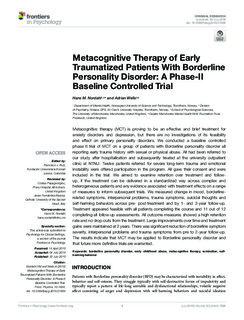| dc.contributor.author | Nordahl, Hans Morten | |
| dc.contributor.author | Wells, Adrian | |
| dc.date.accessioned | 2020-02-13T08:33:07Z | |
| dc.date.available | 2020-02-13T08:33:07Z | |
| dc.date.created | 2019-09-13T17:34:39Z | |
| dc.date.issued | 2019 | |
| dc.identifier.citation | Frontiers in Psychology. 2019, 10:1694 (JULY), 1-10. | nb_NO |
| dc.identifier.issn | 1664-1078 | |
| dc.identifier.uri | http://hdl.handle.net/11250/2641458 | |
| dc.description.abstract | Metacognitive therapy (MCT) is proving to be an effective and brief treatment for anxiety disorders and depression, but there are no investigations of its feasibility and effect on primary personality disorders. We conducted a baseline controlled phase II trial of MCT on a group of patients with Borderline personality disorder all reporting early trauma history with sexual or physical abuse. All had been referred to our study after hospitalization and subsequently treated at the university outpatient clinic at NTNU. Twelve patients referred for severe long-term trauma and emotional instability were offered participation in the program. All gave their consent and were included in the trial. We aimed to examine retention over treatment and follow-up, if the treatment can be delivered in a standardized way across complex and heterogeneous patients and any evidence associated with treatment effects on a range of measures to inform subsequent trials. We measured change in mood, borderline-related symptoms, interpersonal problems, trauma symptoms, suicidal thoughts and self-harming behaviors across pre- post-treatment and by 1- and 2-year follow-up. Treatment appeared feasible with all patients completing the course and 11 out of 12 completing all follow-up assessments. All outcome measures showed a high retention rate and no drop-outs from the treatment. Large improvements over time and treatment gains were maintained at 2 years. There was significant reduction of borderline symptom severity, interpersonal problems and trauma symptoms from pre to 2-year follow-up. The results indicate that MCT may be applied to Borderline personality disorder and that future more definitive trials are warranted. | nb_NO |
| dc.language.iso | eng | nb_NO |
| dc.publisher | Frontiers Media | nb_NO |
| dc.rights | Navngivelse 4.0 Internasjonal | * |
| dc.rights.uri | http://creativecommons.org/licenses/by/4.0/deed.no | * |
| dc.title | Metacognitive therapy of early traumatized patients with borderline personality disorder: A phase-II baseline-controlled trial | nb_NO |
| dc.type | Journal article | nb_NO |
| dc.type | Peer reviewed | nb_NO |
| dc.description.version | publishedVersion | nb_NO |
| dc.source.pagenumber | 1-10 | nb_NO |
| dc.source.volume | 10:1694 | nb_NO |
| dc.source.journal | Frontiers in Psychology | nb_NO |
| dc.source.issue | JULY | nb_NO |
| dc.identifier.doi | 10.3389/fpsyg.2019.01694 | |
| dc.identifier.cristin | 1724605 | |
| dc.description.localcode | Copyright © 2019 Nordahl and Wells. This is an open-access article distributed under the terms of the Creative Commons Attribution License (CC BY). | nb_NO |
| cristin.unitcode | 194,65,35,0 | |
| cristin.unitcode | 1920,22,0,0 | |
| cristin.unitname | Institutt for psykisk helse | |
| cristin.unitname | PH - Nidaros distriktspsykiatriske senter | |
| cristin.ispublished | true | |
| cristin.fulltext | original | |
| cristin.qualitycode | 2 | |

